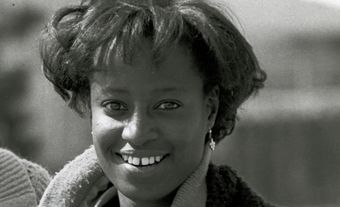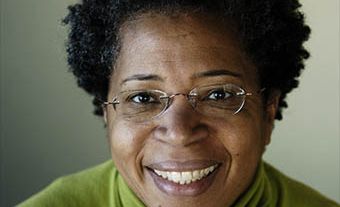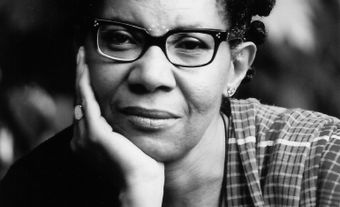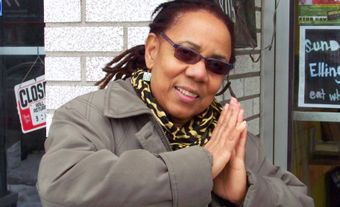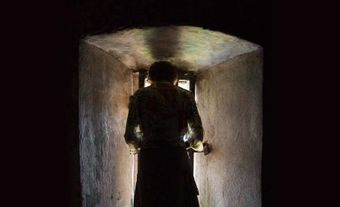Sylvia D. Hamilton, filmmaker, writer, educator (born in Beechville, NS). Sylvia Hamilton specializes in re-evaluating Canadian history and focusing on the perspectives of Black Canadians, particularly Black Canadian women. Her films include Black Mother Black Daughter (1989); the Gemini Award winner Speak It! From the Heart of Black Nova Scotia (1993); the biographical documentary Portia White: Think On Me (2000); and The Little Black School House (2007). She has received many honours and awards, including the Nova Scotia Portia White Prize, the Pierre Berton Award from the Governor General’s History Awards for Popular Media, and the Luminary Award from the Documentary Organization of Canada (DOC).
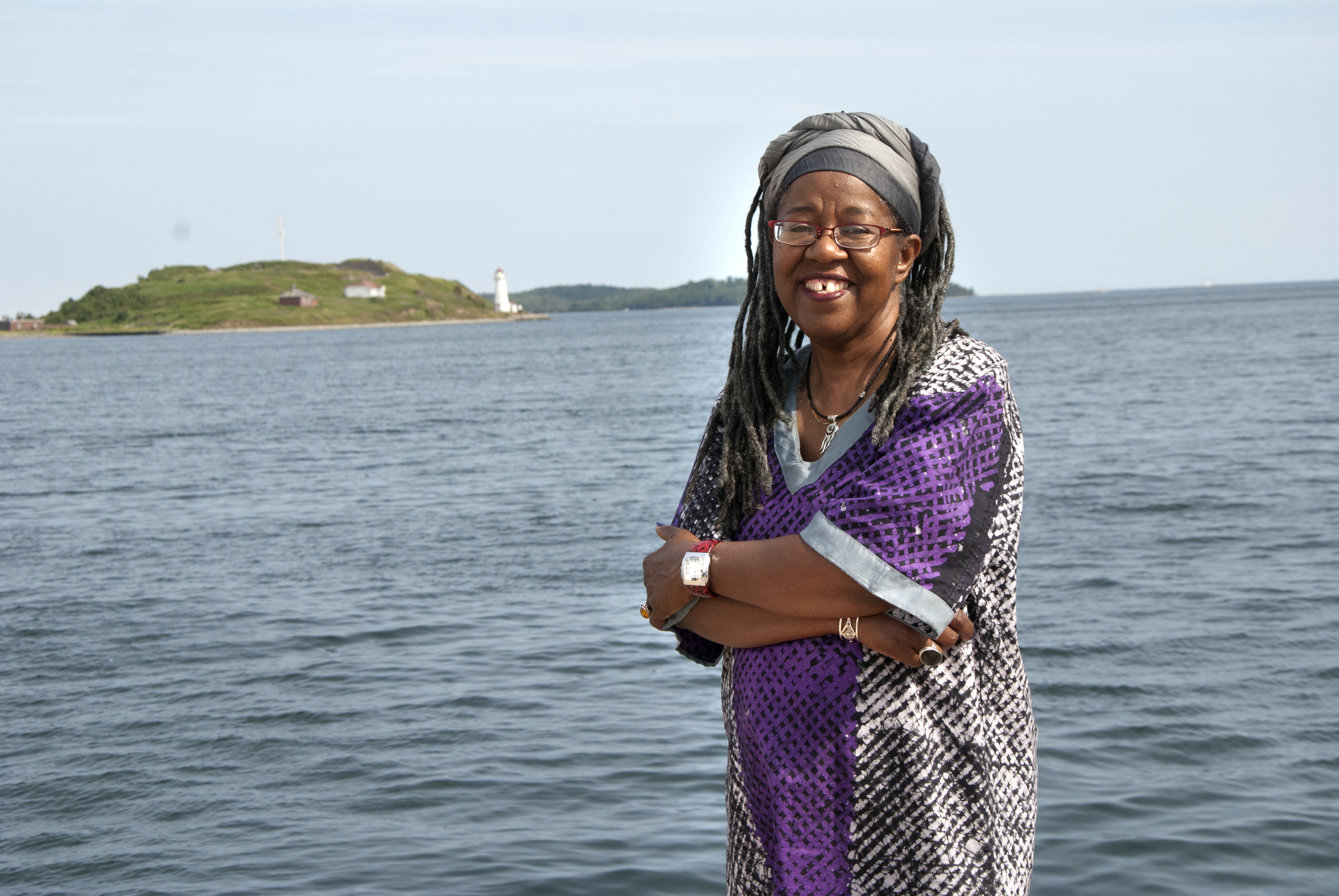
Early Years
Hamilton grew up in Beechville, Nova Scotia. A Black community outside Halifax, it was founded by refugees from the War of 1812. Her mother taught at segregated schools, which Hamilton attended as a child. When she finally attended a non-segregated high school, she was one of only a few Black students. She noticed that the depictions of Black people in textbooks and the media seldom reflected her experience. Hamilton became Beechville’s first high school graduate. She went on to receive a bachelor’s degree from Acadia University in 1972 and a master’s degree from Dalhousie University in 2000.
In 1975, Hamilton joined Halifax’s Reel Life Film and Video Collective. (See also Film Co-operatives.) It encouraged self-representation for female filmmakers. She also worked for the secretary of state in race relations. In 1990, she co-created the New Initiatives in Film (NIF) program for the women’s unit of the National Film Board, Studio D. NIF aimed to provide accurate representations of women in the media. It also created filmmaking opportunities for Indigenous women and women of colour.
Film Work
Sylvia Hamilton draws on collective experiences to document diverse and inclusive communities. In both her essays and films, she brings to light what previous historians have overlooked.
Hamilton’s first documentary, Black Mother Black Daughter (1989), was co-directed with Claire Prieto. It was the first film from the NFB’s Atlantic Canada branch with an all-female crew. This poetic, personal and inspiring film emphasizes the African tradition of oral history by inviting women to share their stories. The film offers revealing accounts (including one from Hamilton’s mother), juxtaposed with rare photographs of Nova Scotia’s Black history. It also touches on the province’s legacy of enslavement and its treatment of the former Black community of Africville. The film challenges recorded narratives that negated Black women’s history. The conversational and participatory nature of the film emphasizes an ongoing struggle.
Hamilton’s next film, Speak It! From the Heart of Black Nova Scotia (1993), confronts failures in the education system to offer diverse representation and opportunities. The film features interviews with Black students cut together with an empowering reggae rhythm. The film won the Canada Award, a special prize for reflecting Canada’s racial and cultural diversity, at the 1994 Gemini Awards.
Hamilton’s documentary The Little Black School House (2007) examines Canada’s history of segregated schools. Told from the perspective of teachers, it depicts how Black Canadians have historically been marginalized. The film suffered a serious setback after Hamilton’s original footage was destroyed in a fire at the NFB’s Halifax office in 1992. Hamilton undertook additional production that brought her, and other Black Nova Scotians, to sites of former segregated schools.
Her other film credits include No More Secrets (1999); Keep on Keepin’ On (2004); We are One (2011); and Portia White: Think On Me (2000), about the trailblazing Nova Scotia singer Portia White. Fittingly, Hamilton was awarded the Nova Scotia Portia White Prize for her success in furthering cultural diversity. Hamilton’s production company, Maroon Films, is named after the Maroons of Nova Scotia.
Writing and Teaching
Hamilton has written and lectured extensively. Her experience as a mentor and educator includes positions with the Trudeau Foundation, Mount Saint Vincent University and the University of King’s College in Halifax. Like her films, her essays explore the difference between experiential and recorded history. They also draw on philosophy to convey what her documentaries capture in images.
Particularly significant is Hamilton’s essay “Stories from The Little Black School House.” The film visits historical remains that Hamilton calls “sites of memory.” She writes, “[T]here are generations of invisible stories embedded in these geographic sites and in the memories of the students, teachers, parents, and trustees who were the schools’ communities. The segregated schools were a direct legacy of the enslavement of Black peoples and the conscious and unconscious racist societal attitudes that are intertwined with that heinous system.”
Hamilton is also an accomplished poet. Her 2014 collection of poetry, And I Alone Escaped to Tell You, engages with history and memory. It was shortlisted for the League of Canadian Poets’ Gerald Lampert Memorial Award and the JM Abraham Poetry Award.
Honours
Hamilton taught journalism at the University of King’s College from 2004 until 2020. She also served as the Rogers Chair of Communications within the School of Journalism. Upon her retirement, the university created the Sylvia D. Hamilton Awards. The five annual scholarships of $2,020 each are open to African Canadian students in any discipline.
Hamilton received the 2019 Pierre Berton Award from the Governor General’s History Awards for Popular Media for playing “a critical role in reshaping the narratives of Canadian culture and history and the role of Black survival and resilience within these.” In 2021, the Film Studies Association of Canada named a speaker’s panel the Sylvia D. Hamilton Dialogues in her honour. In December 2021, Hamilton received the DOC Luminary Award from the Documentary Organization of Canada (DOC). The award recognizes a filmmaker “who embodies the creative spirit of the Canadian documentary tradition and displays generosity by supporting the next generation of doc-makers through mentorship, working behind the scenes to ensure that the genre remains strong for generations to come.”
See also Black Women in the Arts.
Awards
- National Film Board Kathleen Shannon Documentary Award (Black Mother Black Daughter), Yorkton Short Film and Video Festival (1990)
- Rex Tasker Award for Best Atlantic Canadian Documentary (Speak It! From the Heart of Black Nova Scotia), Atlantic Film Festival (1993)
- Canada Award (Speak It! From the Heart of Black Nova Scotia), Gemini Award (1994)
- Association for Media and Technology in Education Festival Award of Excellence (1994)
- Maeda Prize, 21st Japan Prize, International Educational Program Contest, Japan Broadcasting Corporation (1994)
- CTV Fellowship Award, Banff Television Festival (1995)
- Honorary Doctor of Letters, Saint Mary’s University (1995)
- Race Unity Award, Baha'i Community of Canada (1996)
- Halifax Progress Women of Excellence Award, Arts and Culture Category (1996)
- Honorary Doctor of Laws, Dalhousie University (2001)
- Honorary Diploma, Nova Scotia Community College (2002)
- Nova Scotia Portia White Prize (2003)
- Silver Prize (The Little Black School House), Africa World Documentary Film Festival (2009)
- Best Film – People's Choice (The Little Black School House), African Diaspora Film Festival (2009)
- Honorary Doctor of Letters, Acadia University (2010)
- Pierre Berton Award, Governor General’s History Awards for Popular Media (2019)
- DOC Luminary Award, DOC Institute (2021)

 Share on Facebook
Share on Facebook Share on X
Share on X Share by Email
Share by Email Share on Google Classroom
Share on Google Classroom

